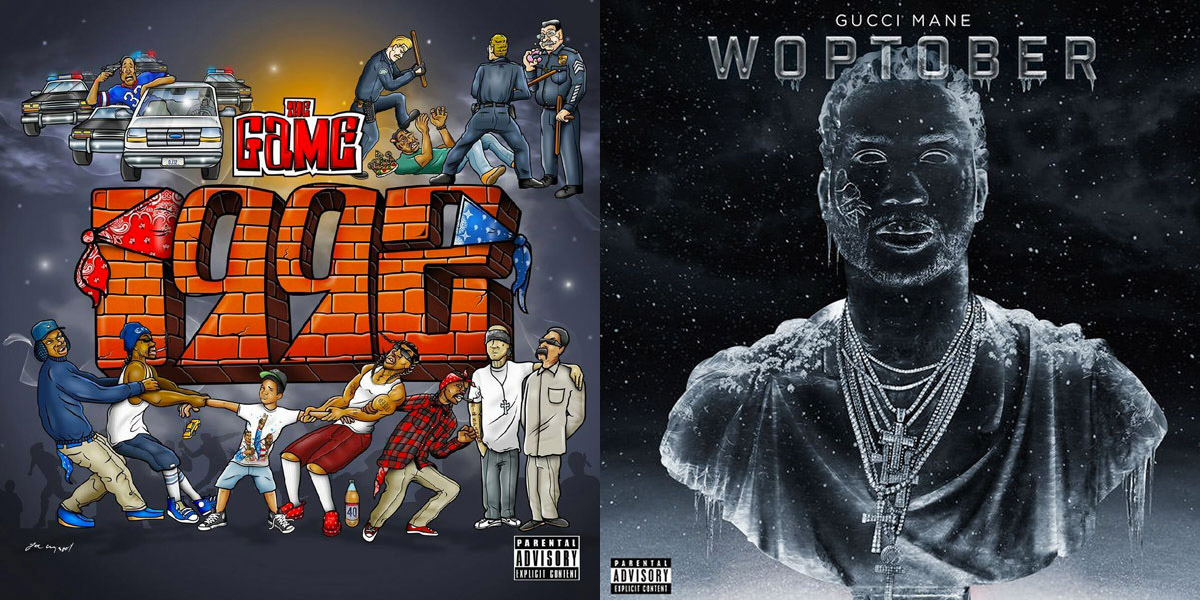Hear This Not That: The Game’s album presents fresh beats, Gucci Mane’s lacks energy

On Friday, rapper The Game released his eighth studio album “1992” (left) while hip-hop artist Gucci Mane released his tenth studio album “Woptober” (right). (Entertainment One Music/Atlantic Records)
By Kun Yong (Sean) Lee
Oct. 16, 2016 6:47 p.m.
Music fans can find it hard to decide which albums to stream and which to skip, considering the surplus of new music released. Each week, A&E columnist Sean Lee will compare two newly released albums and recommend which one students should listen to. This week, Lee compares the hype of The Game’s latest album “1992” with that of Gucci Mane’s “Woptober.”
West Coast hip-hop legend The Game and Atlanta’s king of trap Gucci Mane have once again put their cities on the map.
Both rappers dropped albums Friday while riding on a wave of media hype: The Game’s heated feud with Meek Mill and Gucci Mane’s release from prison made waves across social media – incidences which brought extra attention to the artists’ album releases.
But while The Game’s eighth studio album “1992” lives up to the caliber of his previous works, presenting an old-school rapper with an ear for combining old flow with fresh new beats, Gucci Mane’s tenth studio release “Woptober” sounds rushed, disguising laconic lyricism with club-ready production.
[Last week: Hear This Not That: Green Day versus Sum 41]
On “Intro: Fuck 12,” the opener to “Woptober,” Gucci Mane lazily proclaims, “Yeah it’s 2016, so it’s Guwop year.” But the rapper’s sluggish rapping sounds forced and artificial instead of energetic or on par with his usual spirited performances.
Gucci Mane’s apathetic voice and cheesy lines such as, “Wrist so fucking rocky I can’t even take a selfie,” on “The Left” kill the rest of the tracks on the album. On “Aggressive,” the rapper arrogantly informs his trap peers, “You can’t compete with Gucci so just follow a leader.” But when comparing his lackluster delivery with the energetic flows of up-and-coming trappers like Lil Uzi Vert and 21 Savage, Gucci Mane sounds like a washed-up athlete who can’t let go of the good old days.
The chorus on album closer “Addicted” — “I’m addicted to everything / bad bitches, fast cars, weed and promethazine” — sounds immature given the fact that the rapper is now 36 and still hasn’t stopped rapping about the party lifestyle. His superficial raps leave me wanting deeper introspection from a rapper with a decade-long career to his name.
Unlike Gucci Mane who has lost his spark over the years, The Game sounds as fresh as ever on his album “1992.” Album opener “True Colors/It’s On” finds The Game in classic storytelling mode, effortlessly delivering lyrics that explain how he came to gang life: “Walking from Tanas to the Cedars with my eyes closed / Red bandanna in my pocket, how you hide those.”
[Throwback: Hear This Not That: Sean Mendes versus Devendra Banhart]
Whereas Gucci Mane fills “Woptober” with empty brags, The Game fills “1992” with real stories delivered through technical word play and thought-out bars.
Tracks like “F**k Orange Juice” and “I Grew Up On Wu-Tang” manage to keep The Game’s old-school rhymes relevant by replacing the boom bap beats of ’90s hip-hop samples with trap hi-hat beats, offering the rapper new sonic ground for telling his stories. The standout track from “1992,” “Young Niggas,” features The Game tragically rapping about the true story of his gang mentality that led him to shoot a childhood friend who joined a rival gang.
Unlike Gucci Mane’s languid approach to his craft, The Game raps as if he owes hip-hop for giving him a new lease on life.
Gucci Mane beats his chest and boasts, “I do it so big I make a hater feel little,” but The Game simply acknowledges that his life speaks for itself.
Listen to “Woptober” for a lazy lecture on what trap once was. Listen to “1992” for a look into how hip-hop truly has the power to change some people’s lives.


